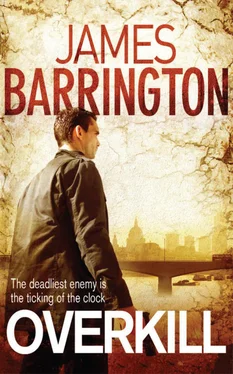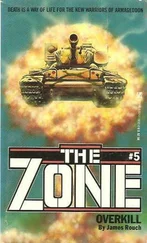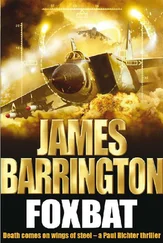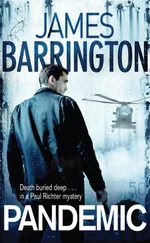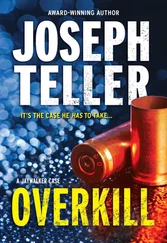He had no idea who was behind the attempt to deprive him of his meagre pension, but he was quite determined to find out. He scanned the road ahead, looking for a bend and some kind of cover where he could get the car out of sight. Richter also needed a dearth of witnesses, and luckily there seemed to be almost no other traffic.
Two miles further on, with the Jaguar out of sight behind him, Richter found it. A left-hand curve, followed by a right, with a farm track leading off to the left, past a dilapidated barn. He hit the brakes hard, hoping that the driver of the Jaguar wouldn’t notice the skid marks on the road, slammed the box into reverse, and backed the Granada off the road.
He only just made it. Less than three seconds after the Ford had rocked to a halt by the barn, the XJ6 roared past the end of the track. Richter hauled the auto shift into drive and floored the throttle. He forced the car, bucking and kicking, back on to the road. Now he was where he wanted to be – behind them.
Richter was doing fifty as he hit the right-hand curve, and saw the Jaguar a quarter of a mile ahead when he entered the straight, with the speedometer needle hovering around the seventy mark. The Jaguar vanished from sight around a bend, and Richter gave the Granada its head. He couldn’t rely on them not seeing the Ford until the last moment, though he hoped they would be concentrating on the road in front, so he had to make up ground when they were out of sight.
The XJ6 was less than two hundred yards in front as Richter came out of the bend, then he lost it almost immediately as the road swung left again. He passed a road sign which brought a slight smile to his lips, announcing bends for two and a half miles, and pushed the Granada as much as he dared.
Then, suddenly, he was right behind them. Richter had practised it often enough, but this was the first time he’d ever had to do it for real. When they saw him, the Granada was less than fifty yards behind them. The Jaguar driver touched his brakes, thought better of it, and put on power again. The shape in the back seat twisted round, gun in hand. Richter watched to see which window he was going for. He moved to the left – he was probably right-handed – so Richter floored the accelerator and swung right.
As the nose of the Granada passed the rear of the Jaguar, Richter swung the car left, still under full power. The XJ6 lurched sideways as the Ford’s nearside front wing hit it, and whatever the driver did then, Richter had them.
Anton Kirov
In his sea cabin on the deck below the bridge and next to the radio room, Valeri Bondarev produced two shot glasses and a bottle of Stolichnaya vodka, and gestured Zavorin to a chair. He poured two measures of vodka and passed one to Zavorin; both men drank, knocking the liquid to the back of their throats. Bondarev poured two more glasses and waited.
‘Thank you, Captain,’ Zavorin said, picking up his glass. ‘Now, let me explain what we will be doing. As you guessed, your new crewmembers are Spetsnaz soldiers. They have cross-trained with the Black Sea Fleet and are all very experienced sailors, which is why they have been selected for this mission.’
‘And the mission is?’ Bondarev asked.
‘All in good time, Captain,’ Zavorin replied, taking a sip from his glass. ‘Now, your original route was what?’
‘One moment.’ Bondarev stood up, left his cabin and climbed the stairs to the chart-house at the rear of the bridge, selected a route-planning chart of the Mediterranean and returned with it to his cabin. He moved the bottle of vodka and the glasses to one side and spread the chart across his desk.
‘We sailed from Odessa, here,’ he said, pointing, ‘and we were programmed to route through the Black Sea to Istanbul, then cross the Aegean to Piraeus, and route west through the Mediterranean to Tangier and then south to Casablanca. We have cargo in the holds for Piraeus, Durrës and Tunis, and we have scheduled cargo collections at Tunis, Marseille and Tangier for delivery to Rabat and Casablanca. The return voyage is much the same, with cargo to be collected in the western Mediterranean for delivery to Sicily, Greece and Crete.’
Zavorin nodded and studied the chart for a few minutes. ‘Well, Captain,’ he said at last, ‘there will have to be some changes.’
Bondarev grunted. ‘I expected that.’
‘The first change,’ Zavorin went on, ‘will be an additional stop to collect cargo – actually special equipment for my men – before we reach Istanbul.’
‘Which port?’ Bondarev asked.
‘I don’t know yet,’ Zavorin replied. ‘This mission was undertaken at short notice, and the equipment will take time to assemble. My guess is Constanta, but it could be Varna or Burgas.’ He tapped the names of the three ports, on the Black Sea’s west coast, with a pencil.
‘No problem,’ Bondarev said. ‘And after Istanbul and the Bosphorus?’
Zavorin looked thoughtful, and used a pair of dividers to measure distances on the chart. ‘I want to keep to the ship’s programmed route as much as possible, to avoid attracting attention. Piraeus should not be a problem, but we will not be able to make Durrës or Marseille if we are to keep on schedule. Yes,’ he said. ‘Have your navigator prepare a new course from Istanbul to Piraeus, then Tunis and Tangier, and signal the authorities in Durrës and Marseille that the Anton Kirov will not be calling at those ports on this voyage.’
Bondarev was in no doubt that this was an order. ‘And after Tangier?’ he asked, jotting a note on a pad.
Zavorin smiled. ‘I don’t think we will make Tangier,’ he said. ‘The ship will develop engine trouble and will be forced to put in to Gibraltar.’
Bondarev bristled slightly. ‘My ship has never had engine trouble.’
Zavorin nodded. ‘I know. That is one reason why this vessel was selected. But on this voyage, it will develop engine trouble and we will put in to port to get it rectified.’
‘Why Gibraltar?’ Bondarev asked.
Zavorin shook his head. ‘You do not need to know that, Captain. Let me just say that we will be collecting another item of cargo there – an item of crucial importance to Russia.’
There was a knock on the door. Bondarev slid it open and took the signal from the radioman – one of Zavorin’s men – who stood there. He read it and then passed it to Zavorin. ‘Good,’ Zavorin murmured. ‘The equipment will be ready for us at Varna in four hours.’
Bondarev bent over the chart. ‘We are now about six hours out of Varna,’ he said.
‘Excellent, Captain,’ Zavorin replied. ‘I will go and brief my men.’
American Embassy, Grosvenor Square, London
John Westwood leaned back in his chair, poured himself another cup of coffee and rubbed his tired eyes. The jet lag was starting to catch up with him, he thought, stifling a yawn. Abrahams sat silently, digesting what he had been told. ‘You see the problem?’ Westwood asked.
Abrahams nodded. ‘Yeah. One, your top-level source in Moscow tells you that a covert assault by the CIS on the West is in progress. Two, you can’t find any trace of preparations for any kind of assault, anywhere. Three, an attack by the CIS makes no sense in the current political climate. Four, the Russians might have developed a kind of super neutron bomb. Five, if they have, and they deploy it, the weapon will actually favour the Western alliance in any future conflict.’ He looked across at his former chief. ‘Is that about it?’
‘Pretty much,’ Westwood nodded.
‘That’s complete nonsense, so we must be missing something. Somewhere there’s a key that will lock that lot, and tie everything together. Right. I understand the background, but what exactly do you want me – or rather CIA London Station – to do about it?’
Читать дальше
